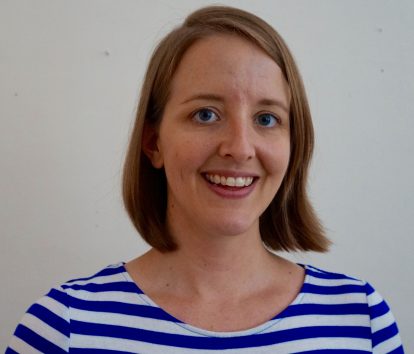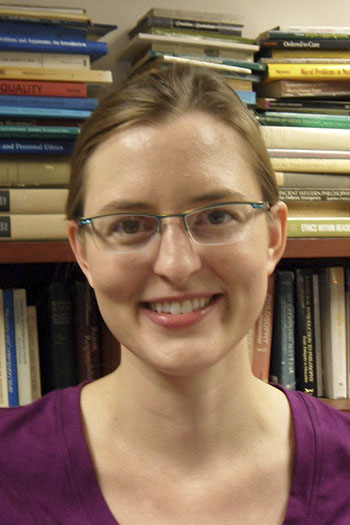Elizabeth Currin, Department of Education
 Currin’s research addresses the “Age of Accountability,” a decades-long period defined by top-down education reforms that position teachers as both the problem and the potential solution for America’s so-called failing public schools. This, Currin argues, leads to increased teacher stress, a loss of creativity, and a shift in teachers’ answering to superiors rather than their own students.
Currin’s research addresses the “Age of Accountability,” a decades-long period defined by top-down education reforms that position teachers as both the problem and the potential solution for America’s so-called failing public schools. This, Currin argues, leads to increased teacher stress, a loss of creativity, and a shift in teachers’ answering to superiors rather than their own students.
Through oral histories of three teacher researchers, Currin uses “zoom analysis” to examine how their work supplies counter-narratives to the “accountability” model. Teacher researchers take an inquiry stance toward teaching, continuously examining their own work in order to hold themselves accountable for improvement. The in-depth narratives of Currin’s participants illustrate this powerful process, making them “historical mentors” for tomorrow’s teachers.
Based on this research, Currin recommends that educators can reclaim accountability through stories and not just numbers. This shift in emphasis would not only motivate more teachers from various backgrounds, but also inspire teachers to share their stories with legislators and administrators. This might lead to a shift in policy that better supports the professional development of teachers and their academic goals for students.
Jaime Ahlberg, “Disability as Difference: Implications for Educational Justice”
 With a view toward educational justice, Jaime Ahlberg considers how conceptions of disability shape social policy, in order to help scholars, policy makers, and educators to think broadly about reform beyond special education in U.S. educational systems.
With a view toward educational justice, Jaime Ahlberg considers how conceptions of disability shape social policy, in order to help scholars, policy makers, and educators to think broadly about reform beyond special education in U.S. educational systems.
Ahlberg explores four models of thinking about disability: 1) the “Medical,” 2) the “Social,” 3) the “Cultural,” and 4) the “Critical Realist.” Ahlberg favors the latter model because it enables consideration of how biology, built environment, individual experiences, psychology, and sociocultural factors are all be relevant to the presence and nature of disability. She further argues that the critical realist model suggests that disability is characteristically a matter of “mere difference” rather than “bad difference”. Encouraging researchers and educators to see disability in this way, and to privilege the reflective accounts of people with disabilities, opens new directions for thinking about disability in educational policy and practice.
With this justice-oriented stance toward educational policy for students with disabilities, Ahlberg hopes to both encourage a dissolution of the hard distinction between ‘special’ and ‘general’ education, and to provide the conceptual tools necessary for policy makers and educators to better understand the educational rights of all students.